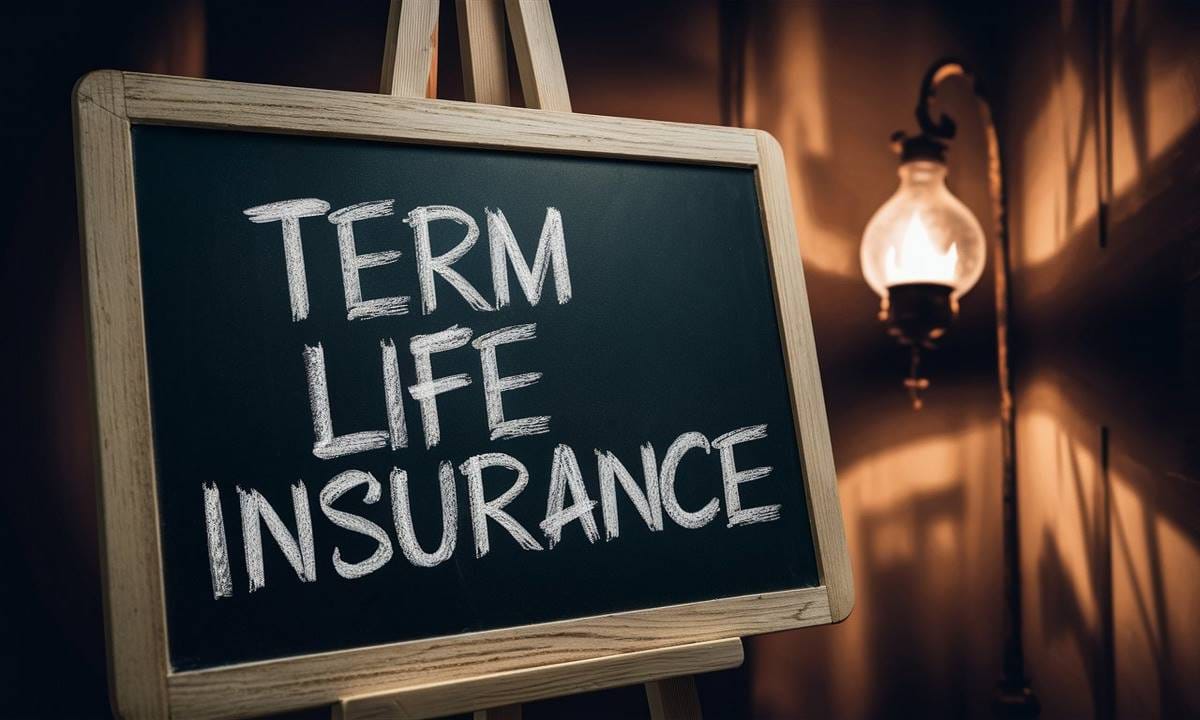Introduction to Term Life Insurance
In the intricate landscape of financial protection, term life insurance stands out as a practical and straightforward option. This form of insurance provides a death benefit to beneficiaries if the insured passes away within the specified term of the policy. It is designed to offer financial security during a set period, typically ranging from 10 to 30 years. As a crucial component of personal finance, understanding term life insurance is essential for anyone seeking to safeguard their loved ones’ financial future.

Understanding the Basics: What Is Term Life Insurance?
Term life insurance is a contractual agreement wherein the insurer provides coverage for a predetermined period, known as the term. During this time, if the insured person dies, the policy pays out a death benefit to the beneficiaries. Unlike permanent life insurance, which offers lifelong coverage and a cash value component, term life insurance is purely protection-focused. The policy expires at the end of the term, and there is no payout if the insured survives beyond this period.
Key Features of Term Life Insurance
Term life insurance is characterized by its simplicity and cost-effectiveness. Key features include:
- Fixed Premiums: Premiums are consistent throughout the policy term, providing predictable costs.
- Death Benefit: A lump-sum payment is made to beneficiaries if the insured dies during the term.
- Term Length: Policies are available in various lengths, typically from 10 to 30 years.
- No Cash Value: Unlike permanent policies, term life insurance does not build cash value or investment returns.
How Term Life Insurance Differs from Permanent Life Insurance
Term life insurance differs fundamentally from permanent life insurance in several ways:
- Coverage Duration: Term life insurance covers only for the length of the term, whereas permanent life insurance provides lifelong coverage.
- Cash Value: Permanent life insurance accumulates cash value over time, which can be borrowed against or used as an investment. Term life insurance does not offer this feature.
- Cost: Term life insurance generally has lower premiums compared to permanent policies, making it a more affordable option for many.

The Purpose of Term Life Insurance in Financial Planning
Term life insurance plays a pivotal role in financial planning by providing a safety net for dependents. It ensures that, in the event of an untimely death, loved ones are not burdened with financial hardships. It is often used to cover specific financial obligations, such as mortgage payments, education costs, or income replacement, thereby offering peace of mind and financial stability during critical periods.
Types of Term Life Insurance Policies
Level Term Life Insurance: Stability Over Time
Level term life insurance features a consistent death benefit and fixed premiums throughout the policy term. This stability makes it ideal for individuals who seek predictable coverage costs and wish to ensure a steady payout for beneficiaries regardless of when the insured dies within the term.
Decreasing Term Life Insurance: Coverage that Adapts
Decreasing term life insurance is designed with a death benefit that gradually decreases over the term of the policy. This type is often used to match decreasing financial obligations, such as a mortgage balance, ensuring that coverage aligns with reducing debt levels over time.
Renewable Term Life Insurance: Flexibility for the Future
Renewable term life insurance offers the option to renew the policy at the end of the term without undergoing a new medical exam. This flexibility allows individuals to extend their coverage beyond the initial term, though premiums may increase with age or changes in health.
Convertible Term Life Insurance: Transitioning Made Easy
Convertible term life insurance provides the opportunity to convert the policy into a permanent life insurance policy without additional medical underwriting. This feature is advantageous for those who may wish to transition to lifelong coverage as their needs evolve.

Benefits of Term Life Insurance
Affordability and Cost-Effectiveness Explained
One of the primary advantages of term life insurance is its affordability. The cost of premiums is significantly lower compared to permanent life insurance, making it accessible for a broader range of individuals. This cost-effectiveness allows policyholders to secure substantial coverage without straining their budgets.
Simplicity and Straightforwardness of Coverage
Term life insurance is straightforward and easy to understand. With a focus solely on providing a death benefit, it eliminates the complexities associated with investment components or cash value accumulation found in permanent policies. This simplicity appeals to those seeking clear and direct coverage.
Customizable Policies to Suit Different Needs
Term life insurance policies are highly customizable. Options such as varying term lengths, coverage amounts, and additional riders (e.g., accidental death benefits) allow individuals to tailor their insurance to meet specific needs and preferences, enhancing the policy’s relevance to their unique situation.
How Term Life Insurance Works
How Premiums Are Calculated
Premiums for term life insurance are determined based on several factors, including the insured’s age, health, occupation, and lifestyle. Generally, younger and healthier individuals will benefit from lower premiums. Insurers use actuarial tables and risk assessments to set these rates, ensuring they accurately reflect the likelihood of a claim.
Understanding the Coverage Period: What It Means for You
The coverage period of a term life insurance policy defines the duration for which protection is in place. It is crucial to choose a term length that aligns with your financial obligations and goals. If the insured survives beyond this period, the policy expires, and no benefits are payable, necessitating a reassessment of coverage needs as the term nears its end.
What Happens When the Term Expires?
Upon expiration of the term, the policy terminates, and no death benefit is paid if the insured is still alive. At this juncture, policyholders may choose to renew, convert, or purchase a new policy. The options available will depend on the specific terms of the original policy and the insured’s current health status.
Choosing the Right Term Life Insurance Policy
Factors to Consider When Selecting a Term
When selecting a term life insurance policy, consider factors such as your age, health, financial obligations, and the length of coverage required. Evaluating these elements helps in choosing a term that adequately covers your dependents’ needs while aligning with your long-term financial strategy.
Evaluating Coverage Amounts and Policy Terms
Determining the appropriate coverage amount involves assessing current and future financial needs, including debts, living expenses, and future goals. Ensure the policy term aligns with the duration of your financial responsibilities to provide comprehensive protection.
Assessing Your Current and Future Needs
Assessing your current financial situation and anticipating future changes is critical in selecting the right policy. Consider potential life events, such as marriage, children, or major purchases, which may impact your insurance needs and necessitate adjustments to your coverage.
Applying for Term Life Insurance
The Application Process: What to Expect
Applying for term life insurance typically involves completing an application form, providing personal information, and undergoing a medical examination. The insurer will evaluate your health status, lifestyle, and risk factors to determine eligibility and premium rates.
Health Assessments and Underwriting Basics
Health assessments play a crucial role in underwriting. Medical exams, health questionnaires, and sometimes additional tests help insurers gauge risk and set appropriate premiums. Maintaining good health can lead to more favorable rates and coverage options.
Common Pitfalls and How to Avoid Them
Common pitfalls include underestimating coverage needs, failing to disclose relevant health information, or selecting an inadequate term length. Avoid these issues by thoroughly assessing your needs, being honest on the application, and consulting with insurance professionals to make informed decisions.
Renewing or Converting Your Term Life Insurance
The Renewal Process: What You Need to Know
Renewing a term life insurance policy involves extending the coverage for another term. It typically requires a new premium assessment based on the insured’s current age and health. Renewal may result in higher premiums, so it is essential to evaluate whether it remains the best option.
Converting Term to Permanent Insurance: Pros and Cons
Converting a term policy to a permanent one provides lifelong coverage and cash value accumulation. While this offers long-term benefits, it may come with higher premiums. Weighing the pros and cons involves considering your future financial goals and the cost implications of permanent coverage.
Common Misconceptions About Term Life Insurance
Addressing the Myth of ‘Not Worth the Investment’
A common misconception is that term life insurance is not worth the investment due to its lack of cash value. However, its affordability and focus on providing substantial death benefits make it a valuable tool for many individuals, especially those prioritizing financial protection over investment growth.
Clearing Up Confusion About Term Length and Coverage
Confusion often arises regarding the appropriate term length and coverage amount. It is essential to match the term with your financial obligations and life stage, ensuring adequate protection without unnecessary expenses. Clarifying these aspects helps in making informed decisions that align with your needs.
Real-Life Applications and Examples
Case Studies: How Term Life Insurance Helped Families
Real-life examples illustrate the impact of term life insurance on families. Case studies demonstrate how policies have provided crucial financial support during times of need, highlighting the importance of having coverage in place to safeguard against unforeseen events.
Scenarios Where Term Life Insurance Is Most Beneficial
Term life insurance proves particularly beneficial in scenarios such as covering a mortgage, providing for children’s education, or replacing lost income. These scenarios showcase how term life insurance addresses specific financial risks and ensures stability for beneficiaries.
Comparing Term Life Insurance with Other Insurance Types
Term Life vs. Whole Life Insurance: Key Differences
Term life insurance differs from whole life insurance in that it offers coverage for a specific term without accumulating cash value. Whole life insurance provides lifelong coverage with an investment component. Comparing these options helps in choosing the most suitable policy based on personal financial goals.
Term Life vs. Universal Life Insurance: What Sets Them Apart
Universal life insurance, like whole life, includes a cash value component and flexible premiums. In contrast, term life insurance is purely protection-focused with fixed premiums and no cash value. Understanding these differences aids in selecting the policy that best fits your insurance needs and financial objectives.
Financial Impact and Planning
How
Term Life Insurance Fits into Estate Planning
Term life insurance plays a significant role in estate planning by ensuring that beneficiaries receive financial support in the event of the insured’s death. It helps cover estate taxes, debts, and provides for dependents, contributing to a well-rounded estate plan.
The Role of Term Life Insurance in Long-Term Financial Goals
Incorporating term life insurance into long-term financial goals involves using it as a tool to manage risks and provide for future needs. By aligning coverage with financial objectives, term life insurance supports overall financial stability and security.
BOTTOM LINE
Term life insurance offers a pragmatic approach to financial protection, characterized by its affordability and straightforwardness. By understanding its features, benefits, and applications, individuals can make informed decisions that align with their financial goals and provide essential coverage for their loved ones.
Frequently Asked Questions (FAQs)
How long does term life insurance last?
Term life insurance lasts for a specific period, known as the term, which typically ranges from 10 to 30 years. The policy provides coverage only for this set duration, and expires when the term ends if the insured is still alive.
What are the benefits of term life insurance?
Term life insurance offers several benefits including affordability, straightforward coverage with fixed premiums, and a substantial death benefit if the insured passes away during the term. For more information on the benefits, check this source.
How much does term life insurance cost?
The cost of term life insurance varies based on factors such as age, health, coverage amount, and term length. Generally, it is more affordable than permanent life insurance due to its temporary nature and lack of cash value.
Can you convert term life insurance to permanent insurance?
Yes, many term life insurance policies offer the option to convert to a permanent life insurance policy without additional medical underwriting. This feature provides flexibility if your needs change over time.
What does term life insurance cover?
Term life insurance provides a death benefit to beneficiaries if the insured passes away within the policy term. It does not cover living benefits or accumulate cash value.
Is term life insurance worth it?
Term life insurance can be worth it for those seeking affordable, straightforward coverage to protect their dependents during specific financial obligations. It provides significant death benefits at a lower cost compared to permanent policies.
What is the difference between term life and whole life insurance?
Term life insurance provides coverage for a specific term and does not build cash value, while whole life insurance offers lifelong coverage with a cash value component that accumulates over time.
Can you cancel term life insurance?
Yes, you can cancel term life insurance at any time, though it is essential to consider the implications such as losing coverage and any potential refunds for unused premiums.
How do I choose the right term life insurance policy?
Choosing the right term life insurance policy involves assessing your financial needs, coverage amount, term length, and evaluating different policy options to match your personal and financial goals.
How do I apply for term life insurance?
Applying for term life insurance typically involves completing an application form, providing personal and medical information, and possibly undergoing a medical exam. The insurer will then assess your risk and determine premium rates.
What factors affect term life insurance premiums?
Factors affecting term life insurance premiums include the insured’s age, health, occupation, lifestyle, and coverage amount. Generally, healthier individuals and those who are younger pay lower premiums.
Are term life insurance premiums tax-deductible?
Term life insurance premiums are generally not tax-deductible for personal policies. However, they may be deductible if the policy is used as part of a business or if specific conditions apply.
Can you add riders to a term life insurance policy?
Yes, many term life insurance policies offer riders that can be added for an additional cost, such as accidental death benefits or disability riders, to enhance the policy’s coverage.
What happens if you outlive your term life insurance policy?
If you outlive your term life insurance policy, the coverage expires, and no death benefit is paid. You may have options to renew, convert, or purchase a new policy.
How does term life insurance compare to other types of life insurance?
Term life insurance is focused on providing protection for a specific period with lower premiums and no cash value. In contrast, whole and universal life insurance offer lifelong coverage and cash value components, often at a higher cost.
What is a level term policy?
A level term policy features fixed premiums and a consistent death benefit throughout the policy term, providing stability and predictability for both costs and coverage.
How do insurance companies determine eligibility for term life insurance?
Insurance companies determine eligibility based on factors such as age, health, medical history, lifestyle, and sometimes occupation. These factors help assess the risk and set appropriate premiums.
Can term life insurance be used for estate planning?
Yes, term life insurance can be used in estate planning to provide financial support for beneficiaries, cover estate taxes, and ensure that dependents are cared for in the event of the insured’s death.
What is a renewable term life insurance policy?
A renewable term life insurance policy allows the policyholder to renew the coverage at the end of the term without a new medical exam, although premiums may increase with age.









